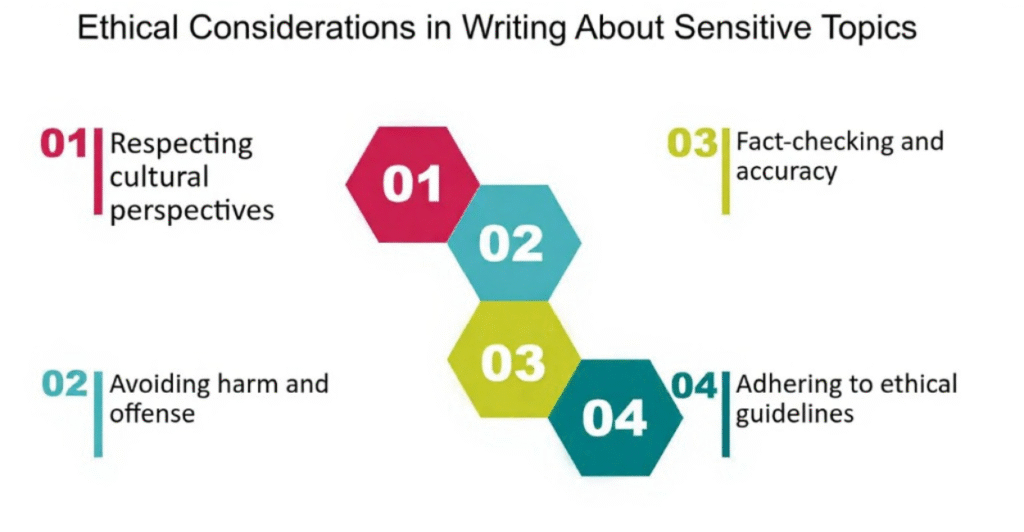Writing about sensitive topics requires precision, caution, and a strong sense of accountability. A badly written article has the potential to mislead readers, upset communities, or even get you into legal hot water. The way you convey information is important, whether you're discussing war crimes, cultural beliefs, or workplace harassment, such as PoSH.
This article explains the fundamentals of ethical content writing, including how to write about delicate subjects, how to comprehend the viewpoints of your audience, and how to prevent bias. You'll discover how to approach contentious issues with compassion while upholding the accuracy of the facts. The goal is to treat challenging conversations with the deference they merit, not to avoid them.
If you've had trouble writing on delicate subjects, this article will provide you with the tools you need to make sure your writing is impactful, responsible, and interesting.
Handling Sensitive Content
1. Topics That Demand Thoughtful Handling
Writing content is not always simple. Certain topics need special attention because they deal with extremely sensitive, cultural, or legal issues. Understanding which subjects require a cautious approach is the first step in writing content on delicate subjects. Usually, these consist of:
- Human Rights Issues: Conversations concerning systematic oppression, discrimination, and exploitation.
- Religious and Cultural Beliefs: Subjects about customs, religions, and ideologies.
- Trauma-Related Subjects – Stories of war crimes, abuse, and personal loss.
- Legal Matters: Information about policies that affect people's rights or workplace harassment (POSH).
A single blunder in ethical content authoring might mislead readers or create harm. It is easier to present these subjects responsibly when one is aware of their importance.
2. The Consequences of Careless Content
Writers must craft narratives that educate rather than deceive. Negligent treatment of contentious issues can result in:
- Misinformation: The dissemination of false information that can harm people's reputations or incite fear.
- Emotional Harm: Content that causes distress because of insensitive language or a lack of empathy in writing.
- Legal Repercussions: Problems such as privacy violations, defamation, or noncompliance with legal requirements.
Your message will be truthful, equitable, and powerful if you are aware of cultural sensitivity and bias-free terminology.
Writing with Conscience and Clarity
A systematic method is necessary when handling delicate subjects to guarantee accuracy, respect and participation. By abiding by ethical standards, miscommunications can be avoided and information can be kept instructive rather than damaging.

1. Ground Your Work in Careful Research
Good research is the first step in writing responsibly. Readers might be misled, and preconceptions might be reinforced by false information. To keep things credible:
- Make use of first-hand sources, expert interviews, and validated reports when researching delicate subjects.
- Verify information from several sources to get rid of prejudice.
- Keep abreast of evolving debates on contentious issues to represent the most truthful viewpoints.
2. Centre Empathy and Human Experience
Facts and figures by themselves don't provide the complete picture. Honour the experiences of people who are most impacted by the subjects you discuss.
- Prioritise polite communication by utilising words that recognise people's difficulties rather than characterising them based only on them.
- When writing about trauma-related subjects, such as war atrocities or workplace harassment like POSH, emphasise the resiliency of those impacted rather than exaggerating their suffering.
- Steer clear of contemptuous or victim-blaming language that could further marginalise groups.
3. Check Your Bias at the Door
Even when it's inadvertent, bias can find its way into writing. Take into account the following to guarantee ethical content writing:
- To remain impartial, speak without bias.
- Specific, thoroughly investigated facts should be used in place of generalisations.
- Examine text from an outsider's point of view to identify incorrect language and challenge unconscious preconceptions.
4. Use Trigger Warnings with Intention
Readers can better prepare for upsetting information by using trigger warnings. When writing about trauma, take into account:
- Placing a clear advisory before parts that cover graphic or sensitive content.
- "This section discusses sexual violence and may be distressing to some readers," is an example of a straightforward warning.
- When required, use content disclaimers to set expectations for readers.
5. Respect Legal Boundaries and Cultural Nuances
Ignoring legal or cultural norms can have negative effects on one's reputation and have consequences. Make sure your writing complies with:
- Laws about sensitive disclosures, privacy, and defamation.
- Being culturally sensitive means learning about local customs before talking about views or behaviours.
- Use inclusive language to prevent offending particular groups.
You can produce powerful content that informs without offending if you approach writing about delicate subjects with study and consideration.
The Last Word: Why Ethical Writing Matters More Than Ever
There is a great deal of responsibility when writing about delicate subjects. The words we use have the potential to empower, heal, injure, mislead, educate, or mute. When contentious topics are handled poorly, they become propaganda tools that strengthen divisions and reinforce prejudices. In order to promote meaningful conversations, a responsible approach places a high priority on creating ethical material while guaranteeing accuracy, cultural sensitivity, and courteous communication.
These concerns are personal for victims of racial discrimination, survivors of gender-based violence, and families impacted by war crimes. A badly written article has the potential to cause long-term harm, disseminate false information, or retraumatize victims. A thoughtful, well-researched article exposes damaging narratives, clarifies things, and encourages society to take responsibility.
These subjects require writers to approach them with empathy, use language free of prejudice, and be dedicated to the truth. Unintended harm can be avoided by using content disclaimers, being mindful of cultural differences, and abiding by the law. Writing ethically calls for consideration, accountability, and constant learning. Every word matters, influencing how individuals view and react to other people's realities.











